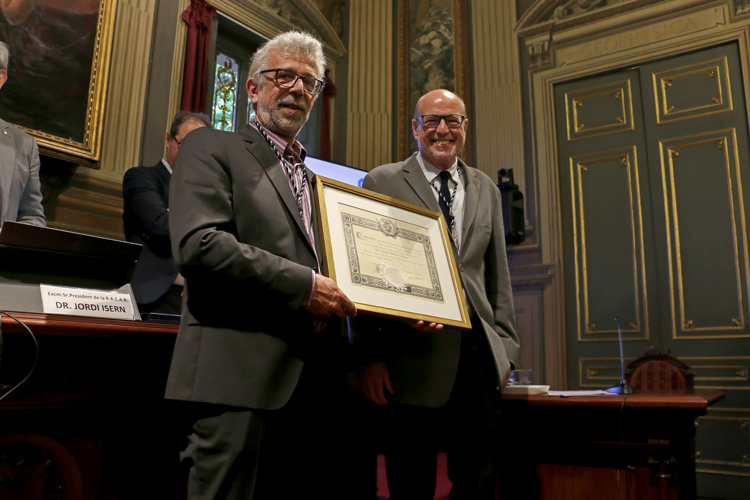Dr Antoni Planas i Sauter, a tenured professor at the IQS School of Engineering, was named a scholar with the Royal Academy of Sciences and Arts of Barcelona in a solemn ceremony held on 2 June.

Dr Antoni Planas i Sauter, a tenured professor at the IQS School of Engineering, was named a scholar with the Royal Academy of Sciences and Arts of Barcelona in a solemn ceremony held on 2 June.
During the public event, Planas read the lecture "Enzymes and sugars: from catalysis to enzymatic engineering", which was addressed on behalf of the Academy by the scholar Ernest Giralt i Lledó.
The Royal Academy of Sciences and Arts of Barcelona is an association of scholars in science and scientific applications that is restricted in terms of the number and selection of its members. The Academy aims to provide encouragement and be the leading reference in the field of Catalan culture and society with regard to Applied Sciences and Arts. Established in 1764, the institution has worked for more than 250 years to disseminate scientific and technological knowledge in the Catalan capital.
The following is an excerpt of the lecture read by Dr Antoni Planas:
"Enzymes are the catalysts of chemical reactions in living organisms, and are characterized by their catalytic efficiency and specificity by the reactions they catalyse, the substrates they recognize, and the stereospecificity of their conversion to products. In the early 20th century, enzymes were identified as proteins and the concept of enzyme catalysis was developed in which the central elements were non-covalent interactions resulting from the binding of the substrate in the active centre of the enzyme to stabilise the transition state of the reaction and provide the driving force to accelerate the reaction speed. In addition to their role as natural catalysts, they are tools to catalyse artificial transformations and produce biocatalysts to create chemicals and materials in the transition towards green chemistry with sustainable technologies in terms of energy and the environment. Enzymology studies the mechanisms, kinetics, and molecular structure of enzymes to decipher the relationship between structure and function. Thanks to the development of DNA molecular biology tools, enzyme engineering arose making it possible to modify natural enzymes to convert them into customized catalysts for chemical transformations of interest. This engineering is done through two complementary strategies: rational design based on the knowledge of the structure and the properties of the enzyme, and directed evolution, in which the approach is more random and based on producing diversity and selecting the variant that works for the desired application. This lecture presents the key concepts of enzymatic catalysis and protein engineering and, in particular, of active enzymes on carbohydrates. These enzymes are responsible for the biosynthesis, degradation, and modification of oligosaccharides, polysaccharides, and glycoconjugates, which are biomolecules that are central to nature and, in addition, molecules with many practical applications. This lecture highlights certain contributions to enzymology and enzymatic engineering in these families of enzymes that are active on carbohydrates, on the mechanism of glycosidases and glycosyltransferases, on the engineering of hydrolases for synthases, and on the directed evolution of glycosynthases and esterases and certain relevant applications in biocatalysis for the production of glycans and glycoconjugates."










